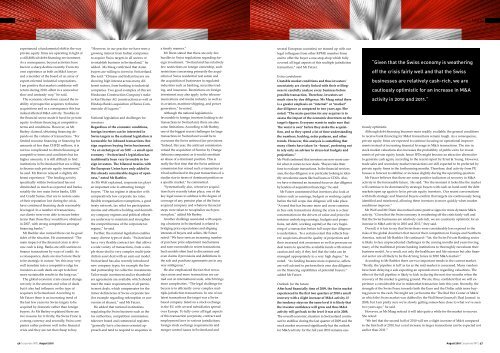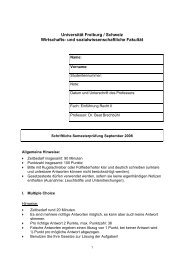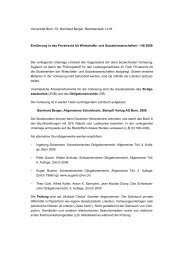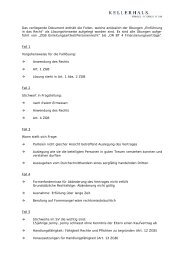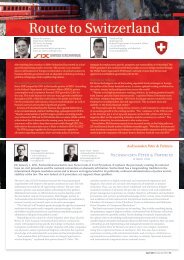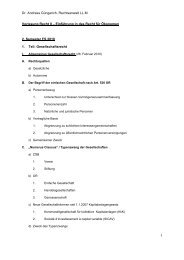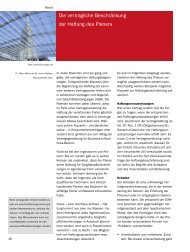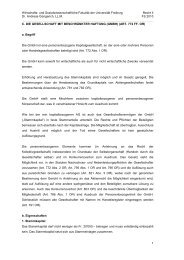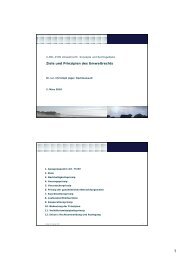Swiss M&A
Swiss M&A
Swiss M&A
Create successful ePaper yourself
Turn your PDF publications into a flip-book with our unique Google optimized e-Paper software.
<strong>Swiss</strong> M&A<br />
experienced a fundamental shift in the way<br />
private equity firms are operating in light of<br />
a still difficult debt financing environment.<br />
As a consequence, buyout activities have<br />
been in a sharp decline recently. From my<br />
own experience as both an M&A lawyer<br />
and a member of the board of an array of<br />
export-oriented industrial corporations,<br />
I am positive that market confidence will<br />
return during 2010, albeit in a somewhat<br />
slow and unsteady way,” he said.<br />
The economic slowdown caused the inability<br />
of prospective acquirers to finance<br />
acquisitions and as a consequence this has<br />
indeed affected M&A activity. Troubles in<br />
the financial sector made it hard for private<br />
equity to obtain financing at competitive<br />
terms and conditions. However, as Mr<br />
Barbey claimed, obtaining financing depends<br />
on the volume of transactions. “For<br />
limited recourse financing or financing for<br />
amounts of less than CHF20 millions, it is<br />
not too complicated to obtain financing at<br />
competitive terms and conditions but for<br />
higher amounts, it is still difficult to find<br />
institutions in Switzerland that are willing<br />
to finance such private equity investment,”<br />
he said. Mr Bonvin relayed a slightly different<br />
experience: “The lending activity<br />
specifically within Switzerland has not<br />
diminished as much as expected and banks,<br />
notably the two main <strong>Swiss</strong> banks, UBS<br />
and Credit Suisse, that are to restore some<br />
of their reputation lost during the crisis,<br />
have continued financing deals reasonably<br />
leveraged. In a number of transactions,<br />
our clients were even able to secure better<br />
terms than those they would have obtained<br />
in 2007, with strong competition amongst<br />
financing banks.”<br />
Mr Baehler also noticed there can be good<br />
sides of the situation. He commented: “The<br />
main impact of the financial crisis is obvious:<br />
cash is king. Banks are still cautious to<br />
finance transactions by ways of credit. As<br />
a consequence, deals are much more likely<br />
to be strategic in nature. Yet, this may very<br />
well translate into a competitive edge for<br />
investors as such deals are apt to deliver<br />
more sustainable results in the long run.”<br />
The global economic crisis caused change<br />
not only in the amount and value of deals<br />
but it also had influence on the type of<br />
acquirers in Switzerland. According to<br />
Mr Fatzer there is an increasing trend of<br />
the last few years for <strong>Swiss</strong> targets to be<br />
acquired by domestic rather than foreign<br />
buyers. As Mr Barbey explained there are<br />
two reasons for it: firstly, the <strong>Swiss</strong> Franc is<br />
a strong currency and secondly, <strong>Swiss</strong> companies<br />
rather perform well in the financial<br />
crisis and they are not that cheap to buy.<br />
46 Corporate INTL August 2010<br />
“However, in our practice we have seen a<br />
growing interest from Indian companies<br />
to acquire <strong>Swiss</strong> targets in all sectors or<br />
to establish business in Switzerland,” he<br />
added. Ms Maag confirmed that Asian<br />
buyers are willing to invest in Switzerland.<br />
She said: “Chinese and Indian buyers are<br />
showing high interest across many different<br />
sectors, from banking to industrial<br />
companies. Two good examples of this are<br />
Hindustan Construction Company’s stake<br />
in Karl Steiner AG (construction) as well as<br />
Hinduja Bank’s acquisition of Banca Commerciale<br />
di Lugano.”<br />
National legislation and challenges for<br />
investors<br />
Regardless of the economic conditions,<br />
foreign investors can be interested in<br />
<strong>Swiss</strong> targets as the national legislation is<br />
favourable for inbound transactions (foreign<br />
acquirers buying <strong>Swiss</strong> businesses).<br />
“As an archetype of an SOE – a small open<br />
economy – Switzerland’s legislation has<br />
traditionally been very favorable to foreign<br />
investors. The bilateral treaties with<br />
the European Union have only added to<br />
this already considerable degree of openness,”<br />
noted Mr Baehler.<br />
As Mr Wolf explained, corporate tax plays<br />
an important role in attracting foreign<br />
buyers. “The tax regime is attractive with<br />
comparatively low corporate tax rates,<br />
flexible reorganisation exemptions, a good<br />
treaty network, tax relief for participation<br />
income and attractive holding and domiciliary<br />
company regimes and political efforts<br />
are underway to maintain and strengthen<br />
the competitiveness of the corporate tax<br />
regime,” he said.<br />
Further, the national legislation enables<br />
many diverse types of deals. “Switzerland<br />
has a very flexible contract law that allows<br />
a wide variety of transactions, from a simple<br />
share deal to very complex multi-jurisdiction<br />
asset deal with an earn-out model.<br />
Switzerland has also recently introduced<br />
new company types, for example the limited<br />
partnership for collective investments.<br />
Tailor-made investment and/or shareholders<br />
agreements are available which should<br />
meet the main requirements of all parties<br />
in most deals, which compensates for the<br />
minor deficiencies of <strong>Swiss</strong> corporate law<br />
(for example regarding redemption or conversion<br />
of shares),” said Mr Fatzer.<br />
He added that national institutions<br />
regulating the <strong>Swiss</strong> business such as the<br />
tax authorities, competition commission,<br />
takeover board and commercial registers<br />
“generally have a business oriented approach<br />
and tend to respond to enquiries in<br />
a timely manner.”<br />
Mr Diem stated that there are only few<br />
hurdles in <strong>Swiss</strong> regulations regarding foreign<br />
investment. “Switzerland has relatively<br />
few restrictions on foreign ownership, such<br />
restrictions concerning primarily the acquisition<br />
of <strong>Swiss</strong> residential real estate and<br />
the acquisition of businesses in regulated<br />
industries such as banking, securities trading,<br />
and insurance. Restrictions on foreign<br />
investment may also apply in the telecommunications<br />
and media industry as well as<br />
in aviation, maritime shipping, and power<br />
generation,” he noted.<br />
Although the national legislation is<br />
favourable to foreign investors looking to do<br />
transactions in Switzerland, there are also<br />
some limitations. According to Mr Barbey,<br />
one of the biggest recent challenges for large<br />
transactions in Switzerland would be to<br />
overcome the <strong>Swiss</strong> antitrust law provisions.<br />
“Indeed, this year, the antitrust commission<br />
vetoed the acquisition of Sunrise by Orange<br />
(telecom companies) as it would constitute<br />
an abuse of a dominant position. This is<br />
really the first time that the <strong>Swiss</strong> antitrust<br />
commission has vetoed such a transaction as<br />
it had authorized in the past transactions of a<br />
similar size in terms of dominant position on<br />
a specific market,” he commented.<br />
“Systematically also, whenever acquisitions<br />
have recently taken place, one of the<br />
key legal issues to address is the degree of<br />
coverage of any pension plan of the <strong>Swiss</strong><br />
acquired company and whatever financial<br />
steps were taken to recapitalize such pension<br />
plan,” added Mr Barbey.<br />
Another challenge associated with acquiring<br />
a business in Switzerland is related to<br />
bridging price expectations and aligning<br />
interests of buyers and sellers. Mr Fatzer<br />
noted: “We have seen an increasing number<br />
of purchase price adjustment mechanisms<br />
and earn-out models in recent transactions.<br />
Such models often lead to discussions and<br />
even claims if provisions and definitions in<br />
the sale and purchase agreements are in any<br />
way ambiguous.”<br />
He also emphasized the fact that nowadays<br />
more and more transactions are carried<br />
out on international scale, which brings<br />
more complexities. “The legal challenge for<br />
buyers is to efficiently cover complex multiple-jurisdiction<br />
transactions. In one of our<br />
latest transactions the target was a <strong>Swiss</strong><br />
based company listed on a stock exchange<br />
in the EU with several subsidiaries spread<br />
over Europe. To fully cover all legal aspects<br />
of this transaction (corporate, contract and<br />
employment laws in various jurisdictions,<br />
foreign stock exchange requirements and<br />
merger control issues in Switzerland and<br />
several European countries) we teamed up with our<br />
legal colleagues from other KPMG member firms<br />
and to offer the buyer a one-stop-shop which fully<br />
covered all legal aspects of this multiple jurisdiction<br />
transaction,” said Mr Fatzer.<br />
Extra carefulness<br />
Unstable market conditions and thus investors’<br />
uncertainty are closely linked with their willingness<br />
to carefully analyse every business before<br />
possible transaction. Therefore, investors set<br />
much store by due diligence. Ms Maag noted there<br />
is a greater emphasis on “internal” or “market”<br />
due diligence as compared to two years ago. She<br />
noted: “The main question for any acquirer is to<br />
assess the impact of the economic downturn on the<br />
target’s figures. Everyone wants to make sure that<br />
‘the worst is over’ before they make the acquisition,<br />
and so they spend a lot of time understanding<br />
the numbers, backlog, order patterns, and other<br />
trends. However, this analysis is something that<br />
many clients have taken ‘in –house’, preferring not<br />
to rely only on advisor to stress-test budgets and<br />
projections.”<br />
Mr Wolf confirmed that investors are now more careful<br />
when it comes to new deals. “Buyers take their<br />
time to evaluate transactions. In the financial services<br />
area, the due diligence is in particular looking to identify<br />
unwelcome assets like bad loans or CDOs. Also,<br />
we have witnessed an increased focus on due diligence<br />
by lenders of acquisition financings,” he said.<br />
Mr Fatzer commented that investors also look at<br />
factors such as earnings, budgets or working capital<br />
before the full scope due diligence will take place.<br />
“A trend that has become more and more common<br />
in buy-side transactions during the crisis is a clear<br />
concentration on the drivers of value and price (for<br />
instance underlying earnings, budgets and projections,<br />
net debt, working capital) at the very beginning<br />
of a transaction before full scope due diligence<br />
is undertaken. To a certain extent this reflects buyers’<br />
suspicions about the quality of projections and<br />
their increased risk awareness as well as pressure on<br />
deal teams to spend the available funds with utmost<br />
caution and only if they feel that the risks can be<br />
managed appropriately to a very high degree,” he<br />
noted. “As funding became more expensive, sellers<br />
are well advised to perform their own due diligence<br />
on the financing capabilities of potential buyers,”<br />
added Mr Fatzer.<br />
Outlook for the future<br />
After hard financially time of 2009, the <strong>Swiss</strong> market<br />
experienced in the first two quarters of 2010 a small<br />
recovery with a slight increase of M&A activity. If<br />
the tendency stays on the same level it is likely that<br />
the investor confidence will grow and thus M&A<br />
activity will get back to the level it was at in 2008.<br />
The overall economic situation in Switzerland continued<br />
to stabilise during the last quarter of 2009 and the<br />
stock market recovered significantly but the outlook<br />
for M&A activity for the full year 2010 remains cau-<br />
<strong>Swiss</strong> M&A<br />
“Given that the <strong>Swiss</strong> economy is weathering<br />
off the crisis fairly well and that the <strong>Swiss</strong><br />
businesses are relatively cash-rich, we are<br />
cautiously optimistic for an increase in M&A<br />
activity in 2010 and 2011.”<br />
tiously optimistic.<br />
Although debt financing becomes more readily available, the general conditions<br />
to receive bank financing for M&A transactions remain tough. As a consequence,<br />
private equity firms are expected to continue focusing on operational improvements<br />
instead of increasing financial leverage in M&A transactions. The rise in<br />
stock market valuations also increases the probability of public exits for investments<br />
of private equity funds, hence IPOs might become an attractive alternative<br />
to generate cash again, according to the recent report by Ernst & Young. However,<br />
trade sales and secondary market transactions are still expected to be preferred by<br />
private equity firms in the forthcoming months. Therefore, deal activity from PE<br />
houses is forecast to stabilise or increase slightly during the upcoming quarters.<br />
Mr Fatzer believes that there are some positive indicators of recovery in M&A<br />
activity in the foreseeable future. He said: “For the moment it looks like the market<br />
will continue to be dominated by strategic buyers with cash on hand until the debt<br />
markets open up again to let in private equity investors. Our recent conversations<br />
with both strategic and financial buyers confirm that targets are continuously being<br />
identified and monitored, allowing these investors to move quickly when market<br />
conditions improve.”<br />
Mr Wolf and Mr Diem also noticed some positive signs for more dynamic M&A<br />
activity. “Given that the <strong>Swiss</strong> economy is weathering off the crisis fairly well and<br />
that the <strong>Swiss</strong> businesses are relatively cash-rich, we are cautiously optimistic for an<br />
increase in M&A activity in 2010 and 2011,” they said.<br />
Overall, it is fair to say that <strong>Swiss</strong> firms were considerably less exposed to the<br />
risks of the global downturn that most of their competitors in Europe and Northern<br />
America, noticed Mr Baehler. He continued: “Yet, the <strong>Swiss</strong> Private Banking sector<br />
is likely to face unprecedented challenges in the coming months and years forcing<br />
many of the traditional private banking institutions to thoroughly reevaluate their<br />
business model. As a result, not only the healthcare and life sciences but also financial<br />
sector are all likely to be the driving forces in 2010 M&A market.”<br />
According to Mr Baehler there are two important trends in the current market.<br />
“Firstly, the ‘pipeline is full’ as far as the mid-market is concerned. Many vendors<br />
have been delaying a sale expecting an upwards move regarding valuations. The<br />
effect of the full pipeline is likely to kick in during the next few months when the<br />
recovery of the market is gaining ground. We are, thus, confident that we will experience<br />
a considerable rise in midmarket transaction later this year. Secondly, the<br />
strength of the <strong>Swiss</strong> Franc towards both the Euro and the Dollar adds more buying<br />
power to the cash. We might not yet become the ‘The Red Hot Center of M&A’<br />
as which the <strong>Swiss</strong> market was dubbed by the Wall Street Journal’s Deal Journal in<br />
2008, but I am pretty sure we’re slowly getting somewhere close to what we’ve seen<br />
two years ago,” he said.<br />
However, as Ms Maag noticed it will take quite a while for the market to recover.<br />
She noted:<br />
“We feel that the second half of 2010 will see a slight increase of M&A compared<br />
to the first half of 2010, but a real increase in larger transactions can be expected not<br />
earlier than 2011.”<br />
August 2010 Corporate INTL 47


